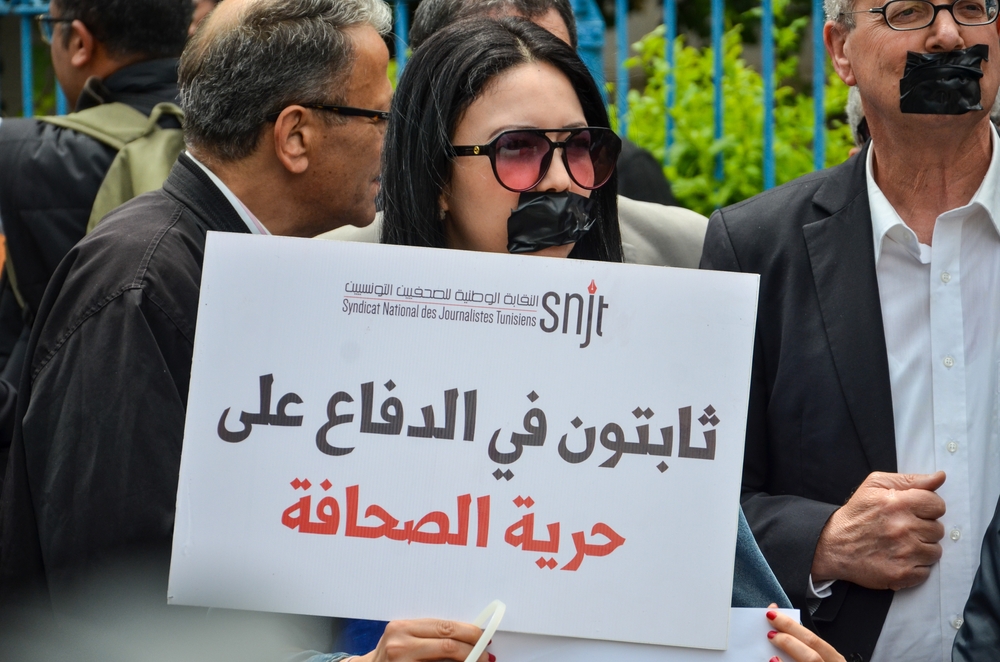The IPI global network calls on Tunisia to cease its use of the country’s draconian cybercrime laws to target and punish journalists. At least six journalists were arrested on cybercrimes charges this May, in the latest crackdown on the media and civil society. The recent spate of arrests comes amid the alarming erosion of press freedom since President Kais Saied declared a “self-coup” in 2021, dissolving the country’s Parliament and rewriting the constitution.
Tunisia’s cybercrime law – or Decree-Law 54 – was enacted in September 2022 as part of a wave of executive decrees issued by the president aimed at consolidating his power and increasing his grip over independent institutions. The decree-law has drawn sharp criticism from local and international rights organizations for a range of provisions that give authorities broad powers to censor online content and to surveil journalists and critics. The decree allows Tunisian authorities to jail individuals for up to five years for disseminating “defamation”, “rumours”, and “false news”, among other vague and overbroad categories. Decree-Law 54 also grants authorities extensive surveillance powers, allowing them to monitor the internet and communications of a suspect without notifying them. Notably, the law restricts criticism of government officials, with jail terms doubled if the target of “defamation” is a member of the government.
Since January 2024, several other Tunisian journalists have been arrested or summoned to court on charges of violating Tunisian cybercrime laws. In January, Zied el-Heni of “Émission Impossible” was handed a suspended six-month prison sentence. Mohamad Boughaleb of Carthage Plus and Cap FM was sentenced in April to six months in jail under a previous defamation law, and also faces additional charges under Decree-Law 54.
May 2024 saw an even worse crackdown from authorities, with six journalists arrested in the span of four days. On May 11, Tunisian police officers raided the bar association offices in Tunis and arrested Sonia Dahmani, a lawyer and a journalist for radio station IFM and television channel Carthage Plus. The same day, they arrested radio show hosts Borhen Bssais and Mourad Zghidi, who were both sentenced on May 22 to one year in jail for their statements on social media criticizing Boughaleb’s sentencing. Houssam Hajlaoui, co-founder of the local news website Inkyfada, was arrested on May 14 and given a suspended nine-month sentence. Those who are detained and awaiting a trial are subject to Tunisia’s vague pretrial detention laws, with no guarantee of a timely release.
IPI is also alarmed by the intimidation and censorship of the journalists documenting these police raids. During their first raid on the bar association offices, police officers arrested Hamdi Tlili, a cameraman for France 24 who was livestreaming the raid; they confiscated and destroyed his camera. In their second raid on the office, two days later, they arrested photojournalist Yassin Mahjoub and deleted his photos of the raid.
“President Saied’s authoritarian rule has undermined Tunisia’s once-exemplary press freedom, creating an environment of fear and oppression”, said IPI Director of Advocacy Amy Brouillette. “IPI demands that President Kais Saied takes steps to honour the right to freedom of speech in Tunisia, beginning with the release of all currently imprisoned journalists. The president should demonstrate his commitment to press freedom by immediately repealing Decree-Law 54. Tunisian media has the right to represent dissenting viewpoints without fear of harassment and retribution by authorities.”
